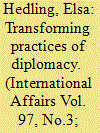| Srl | Item |
| 1 |
ID:
174568


|
|
|
|
|
| Summary/Abstract |
This article examines how the mediatised context of foreign policy provides new opportunities for political leaders to both frame and project their own leadership role to new audiences. The past ten years have witnessed a sharp rise in political leaders’ use of new social media to communicate on a range of foreign policy issues. We argue that this new media context of foreign policy, combined with a bolstered leadership mandate, has been central to the construction of a more visible public leadership role for the EU High Representative in the post-Lisbon era. Departing from recent scholarship on performative leadership and new media in International Relations theory, we develop an original theoretical framework drawing on Erving Goffman’s dramaturgy of impression management. We employ the concept of “leaderisation” to analyse how mediatisation shapes the leadership process in terms of personification and drama to enable new forms of interaction with followers. We apply this framework in an illustrative case study focusing on the process of negotiating the EU Global Strategy. This diplomatic process provided the High Representative Mogherini with a stage on which she could frame herself in a central leadership position vis-à-vis European citizens to mobilise greater legitimacy for the EU as a global actor.
|
|
|
|
|
|
|
|
|
|
|
|
|
|
|
|
| 2 |
ID:
178090


|
|
|
|
|
| Summary/Abstract |
This article explores the transformative role of practices of countering digital disinformation in European Union diplomacy. It argues that an overlooked dimension of the change brought by the rise of digital disinformation is located in the emergence of everyday countering practices. Efforts to counter disinformation have led to the recruitment of new actors with different dispositions and skill sets than those of traditional diplomats and state officials in diplomatic organizations such as the European External Action Service. Focusing on the countering efforts by the East StratCom Task Force, a unit introduced in 2015, the article argues that the composition of actors, the task force's practices and the reorientation in audience perception it reflected, contributed significantly to institutional transformation. Drawing on 23 interviews with key actors and building on recent advancements in international practice theory, the article shows how change and transformation can be studied in practices that have resulted from digitalization in international politics. The article thus contributes to an increased understanding of the digitalization of diplomacy in which new practices can emerge from both deliberate reflection and experimentation.
|
|
|
|
|
|
|
|
|
|
|
|
|
|
|
|
| 3 |
ID:
183710


|
|
|
|
|
| Summary/Abstract |
On 26 March 2020, the leaders of the Group of twenty major economies (G20) convened in an emergency virtual meeting to discuss the extraordinary situation facing the world. Virtual summitry provided a stark visual contrast to the traditional staging of modern multilateral diplomacy – leaders were suddenly responsible for their own staging, leaving them with new opportunities to create a favourable impression of how they, and their respective state, would be seen. Taking the disruption of virtual summitry as a starting point, we focus on the resulting new opportunities for visual diplomacy. We draw on the symbolic interactionism of Erving Goffman and we argue that status signalling in this context was based on a shared understanding of the symbols and resources that have social value in the interaction order of summit diplomacy. Based on a visual analysis of 51 photographs from the G20 video conference, we find that the visual performances during the extraordinary meeting reflected evident, but not necessarily intentional, attempts at status seeking. The article thus contributes to an increased understanding of how visual performances contribute to uphold status distinctions in multilateral diplomacy.
|
|
|
|
|
|
|
|
|
|
|
|
|
|
|
|